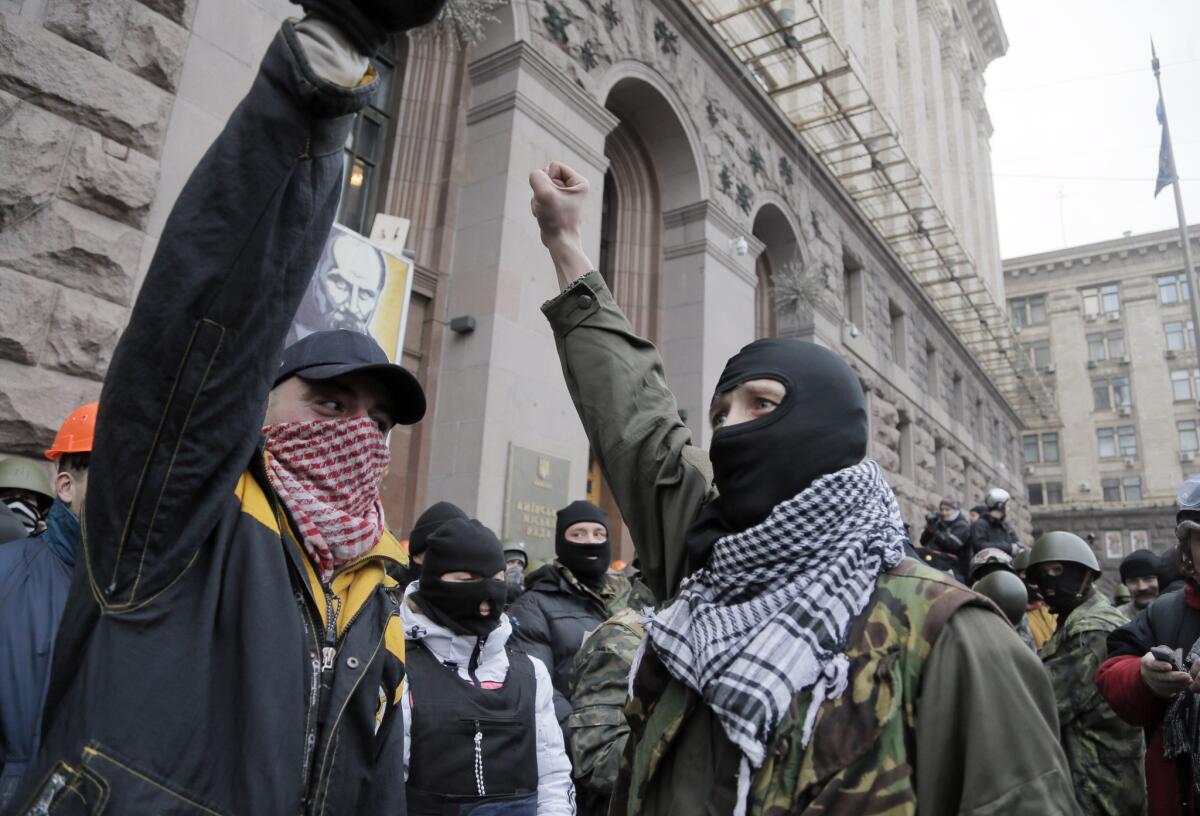Ukraine political crisis defused as protesters accept amnesty

MOSCOW — Anti-government protesters who have disrupted traffic and official functions in major Ukrainian cities for nearly three months vacated Kiev City Hall and other key state buildings Sunday, defusing the worst crisis to beset the deeply divided former Soviet republic in a decade.
Opposition activists have insisted that their concession, in exchange for the release of the last 234 detained protesters, won’t end their campaign to force Ukrainian President Viktor Yanukovich to resign. That has been the unwavering demand of urban Ukrainians since late November, when Yanukovich unilaterally decided to scrap an association agreement with the European Union in favor of maintaining economic ties with Russia.
But the lifting of the occupation and easing of traffic barricades in the Ukrainian capital appeared likely to curb the momentum of the protest movement and buy Yanukovich time to regroup after his prime minister was forced to resign three weeks ago.
Ukraine is badly cleaved into nearly equal factions of Western-leaning urbanites and the eastern Ukrainian industrial and farming belts where enterprises are still dependent on Russian supplies and markets.
Like a number of other former Soviet republics, Ukraine was working toward closer economic cooperation with the 28-nation EU and was due to sign an association agreement at the Western bloc’s summit in Lithuania at the end of November.
But under pressure from Russian President Vladimir Putin, Yanukovich declined to sign the accord and announced that Ukraine would maintain its traditional alliance with Moscow within Putin’s proposed alternative trade bloc of former Soviet states, the Eurasian Union. The Kremlin has since promised a $15-billion bailout loan to its debt-laden neighbor and post-Soviet ally.
Kiev City Hall had been the de facto command center of the anti-government action and its hand-over, under the mediation of the Swiss ambassador to Ukraine, was the key concession asked of the protesters in exchange for the prisoner release and the dropping of all criminal charges against those detained.
Protesters also lifted barricades that had blocked traffic on central Grushevsky Street, Sergei Sobolev of the opposition Batkivshchina Party told Ukraine’s Channel 5 television.
Several thousand anti-government protesters turned out Sunday afternoon in Independence Square, also known as Maidan, but their numbers and energy were palpably diminished from the December height of the protest when as many as 1 million people flooded the heart of the capital to denounce Yanukovich and his regime. Hundreds have been injured in clashes with police and security forces, and at least three protesters have been killed in the protracted standoff.
The U.S. State Department on Saturday hailed the prisoner release and the opposition’s agreement to vacate government buildings under the amnesty plan, which was drafted last month but rejected then by the protesters as insufficient. In a statement issued in Washington, the Obama administration urged the swift formation of a transitional government to replace that of former Prime Minister Mykola Azarov, who resigned Jan. 28.
“The next step in this process should be the formation of a multiparty technical government, with genuine power-sharing and responsibility,” State Department spokeswoman Marie Harf said.
Russian media, most of which are under strong Kremlin influence, have accused the United States of encouraging the anti-government unrest in Ukraine as part of what Putin and his allies consider an inappropriate policy of interference in the country’s domestic affairs. The accusation gained some credibility last week when a clandestinely taped conversation between the State Department official responsible for European affairs, Victoria Nuland, and U.S. Ambassador to Ukraine Geoffrey R. Pyatt, revealed them discussing Washington’s preferences for which opposition figures would be included in the new government.
A leading opposition activist, Arseniy Yatsenyuk, signaled continued defiance of the government Sunday when he told the crowd at Maidan that he had again rejected the offered post of prime minister unless Yanukovich first agrees to constitutional reforms that reduce the power of the presidency.
“I cannot be bought with posts, Mr. President. Go ahead and buy your henchmen,” Yatsenyuk told the protesters, according to the Associated Press in Kiev.
News agencies in the Ukrainian capital said several hundred protesters wielding clubs and decked out in protective helmets continued to stand guard at City Hall with plans to retake the building unless the government makes good on promises to close the criminal cases against hundreds of protesters.
Chief Prosecutor Viktor Pshonka told Ukrainian media Saturday that if the occupied buildings were handed over and traffic blockades lifted by Monday, his office could begin closing the criminal cases by Tuesday and that all outstanding charges would be dismissed within a month.
Twitter: @cjwilliamslat
More to Read
Start your day right
Sign up for Essential California for news, features and recommendations from the L.A. Times and beyond in your inbox six days a week.
You may occasionally receive promotional content from the Los Angeles Times.







